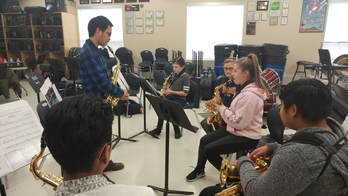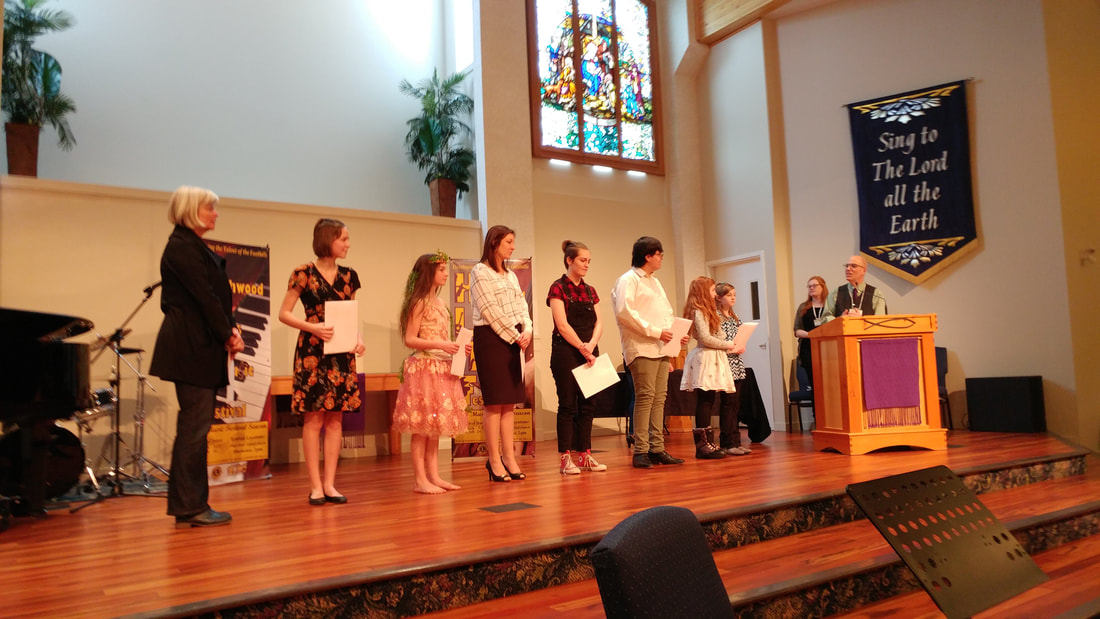All About Recorded Assessments (Playing Tests)
In Concert Bands, there are only 2 recorded playing tests students must submit all year, and an optional third assignment.
- List A, Due December 12, 2022
- List B, Due March 17, 2023 (unless playing a List C piece in Festival, see below)
- List C, Due May 27, 2023 (unless playing a List C piece in Festival, see below)
List A and List B PiecesStudents selected their own pieces from the appropriate Royal Conservatory of Music Repertoire book for their instrument. These selections challenge the student to perform their instrument soloistically, and demands that they have strong skill on their instrument.
Percussionists choose a Snare Solo for their List A piece, and a Mallet Solo for their List B piece. These pieces demonstrate the basic technique and skills students are expected to have at their grade level. Their marks are cumulative. As you can see, the students select their own pieces to play as playing tests, not some arbitrary selection made by Mr. Windsor. The List A and List B pieces end up being comprehensive assessments that are universally understood as good measurement tools, giving students the opportunity to showcase their technical skill and their employment of volume and style in their music. The List C piece does the same, but opens up their musicking to selections that aren't classical in nature. Every student is also given access in both BandLab and the Opus Administrative Assistant to an mp3 Piano Accompaniment they can use to practice, as well as a reference mp3 recorded by a professional on their instrument they can play along with. They will be able to record with these accompaniments in BandLab. |
List C PieceThis is another piece students select, but they can come from any source (pop, movie theme, classical, jazz, etc.). They must not be too challenging or underwhelming. Mr. Windsor arranges the students' choices for their instrument.
Students may opt to play a List C piece in a music festival. If they choose to do so, we switch the due date of the List C piece with the due date of the List B piece. Percussionists are encouraged to make any selection they wish, and are welcome to play their selection on the piano. The List C pieces provides students with the opportunity to improve a List A or List B mark, or get a bonus mark. It is not a required assignment, but can make a big difference to a student's grade in Concert Band. |
Planned Practice and Late SubmissionsAt the beginning of the submission period, students worked on an assignment that helped them both connect to the music and organize their practice strategy. This assignment helped students make a step-by-step and goal-by-goal schedule for their practice. Therefore there is no reason for late submissions.
If a student does not submit their performance on time, they will be expected to perform their selections outside of school hours. |
Can students resubmit their performances?Absolutely, but within reason. No submissions, whether original or resubmissions, will be accepted after June 2, 2023. Resubmissions are only accepted from students who have already submitted on time. If a student wishes to have this opportunity, they must demonstrate their effort to begin with by completing work in a timely fashion. Resubmissions can still be submitted through Charms.
Opting to perform a List C piece is an alternative to resubmission. |
How do students submit their recordings?
Using BandLab. Students have had this tool demonstrated to them in class, and can access it and all the supporting tools they need through the Opus Administrative Assistant.
How can I help as a parent or guardian?
 Saxophone players practicing during Self-Directed Learning with a Proteus Saxophone Quartet Member.
Saxophone players practicing during Self-Directed Learning with a Proteus Saxophone Quartet Member.
Check in with your student on a regular basis about their practice plan. You can also check in on PowerSchool on a regular basis to see if their recordings have been marked.
You can also help by giving your student a regular space and time to practice their music. They should practice every day, but it shouldn't need to be more than 10 minutes each day. Even 5 minutes each day should work. This is not the same as being over a half hour once weekly, as practice with lots of time in between is far less effective than making a regular habit. Practice is the development of good habits for musical abilities, and habits are best formed if you do them regularly and often.
You can also help by giving your student a regular space and time to practice their music. They should practice every day, but it shouldn't need to be more than 10 minutes each day. Even 5 minutes each day should work. This is not the same as being over a half hour once weekly, as practice with lots of time in between is far less effective than making a regular habit. Practice is the development of good habits for musical abilities, and habits are best formed if you do them regularly and often.
Music Education is in our schools because we value it.
|
These playing tests are ways your student demonstrates their musicality, their creativity, and their understanding of beauty. They must actively develop connections between both hemispheres of the brain to succeed. They must develop self-discipline, trustworthiness, and collaborative skill in order to succeed. These are the habits of Engaged Thinkers and Ethical Citizens with an Entrepreneurial Spirit. It is the only school-based activity that consistently exposes students to these growth mindset habits, habits that cannot be duplicated by any machine. Students must engage in these activities to reap the benefits. These recording assessments are just one way students do so.
|

